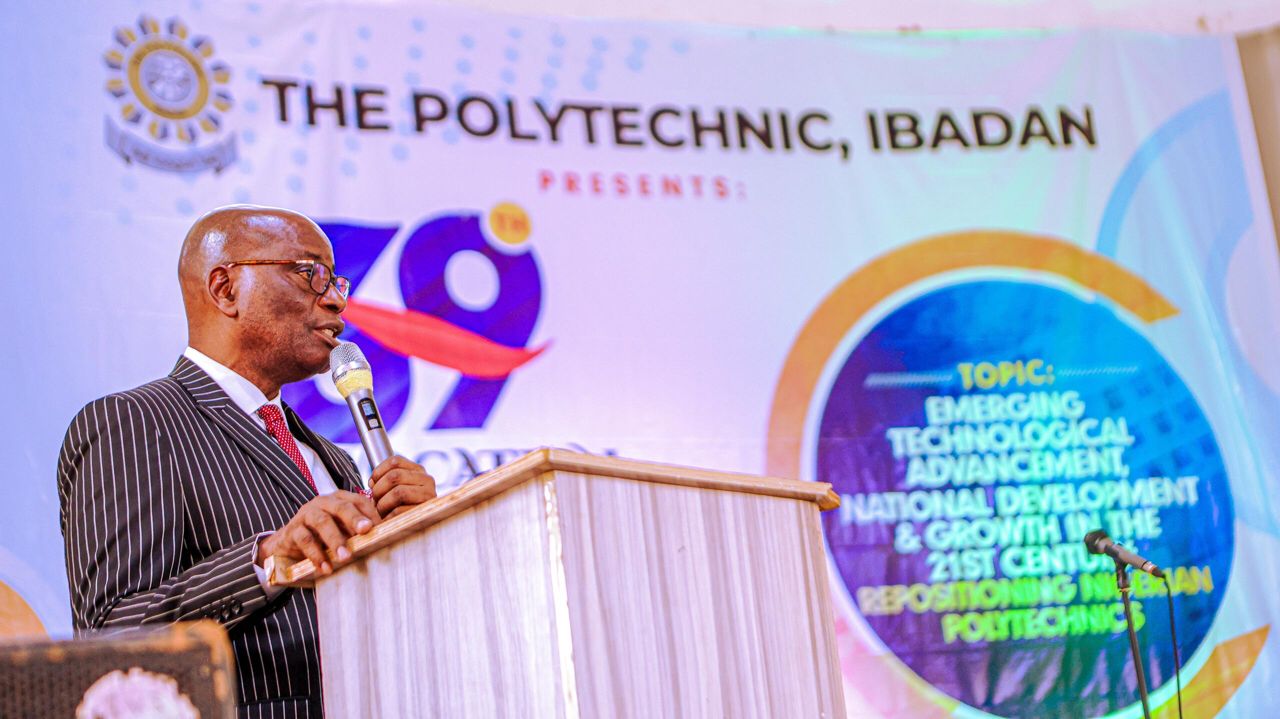The immediate past Vice Chancellor, University of Lagos, Prof. Oluwatoyin Ogundipe has emphasized the importance of polytechnic programmes, as the best fit for the upgrade of the nation’s economy, that had been out of sync for a long time.
According to him, the inspiration of the founding fathers of the polytechnics, Ibadan Polytechnics inclusive, is to provide manpower that would bridge the gap that is well identified in the training acquired from the universities, not developed to prepare the skilful graduates for practical hand-on venture, needed for industrial implementation.
Prof. Ogundipe made the emphasis while delivering the 39th Convocation Lecture of The Ibadan Polytechnic on recently in Ibadan.
The theme of the lecture is: Emerging Technology Advancement, National Development, and Growth in the 21st Century; Repositioning Nigerian Polytechnics.
According to him, not giving adequate attention to the crucial roles of polytechnic educational programme to support the small and medium scale industries, has constituted a major set back to the much desired economic growth of the country.
The don noted that the successful repositioning of polytechnics in the country, would require a concerted effort from the government, industry and educational institutions, adding that with the right policies, investment and commitment, these polytechnics could play a central role in equipping the country’s youth with the skills needed to thrive in the digital economy,
He further explained that without the prosperity of the SMSEs in the country’s economy ecosystem, the nation could find it difficult to enjoy economic prosperity built on non-oil trades.
The don explained that this invariably meant that the polytechnic training was expected to serve as the backbone of the country’s economy.
According to him, Nigeria has a lot to gain from encouraging the polytechnics because it has high potential to reduce unemployment through acquisition of hand-on training by the students in
various national areas of urgent needs.
“This means the students can earn a living for themselves while still in school. Thus, the polytechnic training guarantees not only access to certificates, but also make the students financially independent through the cultivation of the culture of learning and practising the theories in the market place.
“Ultimately, repositioning the Nigerian polytechnics system to be at the forefront of technological innovation, is crucial for national development and economic growth in the 21st century.
“By modernizing curricula, improving infrastructure, fostering industry partnerships, and investing in faculty development, Nigerian polytechnics can become key drivers of technological advancement and economic diversification.
“This would not only enhance the employability of graduates, but also contribute to Nigeria’s broader goals of reducing unemployment, improving productivity and building a knowledge-driven economy,” he said.
He curriculum reform sited a rejig of polytechnic sector to enhance its repositioning and growth, using active drivers, such as the curriculum reform, infrastructural upgrades, industry partnerships, faculty development, and a focus on research and innovation motivated by the industry experience of the students.
Highlighting on curriculum reform and integration of emerging technology, Prof. Ogundipe explained that in Nigeria’s educational system, there was a major area of struggle between the players in the sector and the government’s educational authority.
According to him, in such a case, one of the most pressing issues facing the country’s polytechnics is the outdated nature of their curricula.
“The pressure force (especially the workforce unions) has been very active in promoting the agenda of reflecting the industry’s needs, in every aspect of the training of the tertiary students.
“One of the major areas of these, is the evolution of the courses offered, which is expected to influence the industry’s needs. Thus, many polytechnics still focus on traditional fields such as civil engineering, electrical engineering and business studies, with limited incorporation of cutting-edge technologies.
“To address this, polytechnics must modernize the current curricula to include emerging technology disciplines such as AI, machine learning, data science, blockchain, cybersecurity, renewable energy and robotics.
“This curriculum overhaul should not only cover the basics of these technologies but also include hands-on training and real- world applications. By providing students with exposure to the latest technological advancements, polytechnics can equip them with the skills required to thrive in the modern workforce
“Ofcourse another consideration among many others is that infrastructural development and technological upgrades.The situation of the educational sector in Nigeria calls for urgent attention. This is mainly due to lack of basic tools for some of the hand-on knowledge that the students need to acquire, to make their ability to operate on the field more effective and highly proficient.
“There are many benefits for the nation and its government, if the investment required for the sector could be provided. It is clear that the Nigeria’s demography is heavily tilted toward the youth. These are those who are students in both secondary and tertiary levels of education,” he said.
He noted that this class of Nigerians is restless in that they are result-oriented in their mindset, thus, any investment by the government in their training could be exported to other nations of the world as a product of ‘japa’ syndrome.
According to him, Nigeria can formulate a policy that will make the nation acquire huge foreign exchange from the exportation of these youth, to other countries for them to make use of both heads and hands, for wealth creation for the nations of their sojourn.
“So, the current state of the infrastructure must be urgently and timely improved, to give the nation Nigeria this kind of privilege that would not only make them a sought-after talent, but also fetch enough funds for the home country to be much appreciate than its current status in the comity of nations. Thus, modern educational facilities and infrastructure is a win-win for Nigeria.
“It is believed that the polytechnic education system is developed to give the students the opportunity to practise at intervals the training that they acquire in the short-term, so as to help them to become versatile in their areas of chosen field of practice.
“This is well supported by the one-year industrial training exercise that expose every student to a 12-month period of field knowledge acquisition, through the engagement of such students in activities that would promote the use of their hands, to carry out tasks that will uplift their career development, while still studying for certificates,” he said.
The UNILAG 12th vice chancellor however noted that just like other sector of the nation’s educational system, the Nigerian polytechnics were currently face with several challenges, ranging from outdated curricula, inadequate infrastructure, poor funding, to lack of modern equipment and technology.
According to the professor of Botany, with these serving as setback to the sector, there is an urgent need to review the agenda, scheme and programmes of polytechnics in the country, to reflect the new and emerging demand of the national employment ecosystems that would make the polytechnic system a critical and essential source of national wealth creation, through entrepreneurship.
“This is because the above listed constraints and hinderances have set a huge wedge across the smooth transition of the students, prepared under the current dispensation to be able to deliver on the new expectations and mandates of the 21st century polytechnic system, as an effective laboratory and incubator for the budding entrepreneurs with the rapidly changing demands of the 21st- century workforce.
“Unlike universities, which are more focused on theoretical knowledge and research, polytechnics specialise in practical skills that are directly relevant to the job market. This makes them essential to the country’s efforts to bridge the skills gap and foster the development of a tech-savvy workforce that can drive the nation’s economy forward,” he stated.
He noted that polytechnic training guarantees not only access to certificates, but also make the students financially independent through the cultivation of the culture of learning and practising the theories in the market place.
According to him, this nature of training is needed in the country, at such a time as this, when there is scarcity of employment at all levels and the unemployment rate, growing daily.
“In this case, the polytechnic graduates have very high potential of entrepreneurship through their training to create jobs.
“More importantly, the polytechnic has a lot to gain and achieve through the deployment of modern technology in the training and acquisition of knowledge by the students. This includes those tools that are available in large number for ease of learning and practice.
“The development of digital infrastructure, including robust internet connectivity, online learning platforms and cloud computing services, is also essential for equipping students with the necessary skills to succeed in a digitally driven world.
“ These technologies have the potential to drive economic diversification, enhance productivity and improve the quality of life in both developed and developing countries.
“For Nigeria, embracing these technologies is imperative for sustainable national development. The country is grappling with challenges such as youth unemployment, underdeveloped infrastructure and a largely oil-dependent economy.
“By adopting and integrating emerging technologies, Nigeria can create new industries, generate employment, and reduce its reliance on oil revenues,” he stated.
The don also identified collaboration with Industry and the private sector as a way out in the repositioning of the polytechnics, in the face of the national quest for the tertiary educational sector to produce and supply market-ready graduates for the various needs in the nation.
According to him, the development has reached a level where there is a huge knowledge gap between the academia and the labour market which make many employers of labour to augment the training offered by our tertiary institutions with market-relevant training.
“This has made a number of employment outlets to engage in graduate trainee programs for the fresh graduates as prospective employees in many cases.
“For polytechnics to effectively contribute to national development, there must be a stronger alignment between education and industry needs. Collaboration with the private sector, especially technology companies, is key to ensuring that polytechnic graduates possess relevant skills.
“These partnership can take the form of internships, industry- sponsored projects, joint research initiatives and mentorship programs. This will grant access to the students to gain necessary hand-on experience and cutting-edge skills that will make them more employable on graduation.
“ And on this note, prepare them for both employment and entrepreneurship responsibility that would reduce the employment rate in the society.
There are several nations of the world that enjoy huge benefits from a functional polytechnic education. In this regards, Nigeria’s polytechnic system, just like it is practised in Germany, can establish a stronger relationship with industries and private sector.
“However, there has been serious setback for this to gain implementation. But it would be advisable that for the private sector to participate in training these students, the companies may be granted tax-incentives or tax-reliefs for those companies that participate in the training programme. The structure public-praivate partnership, could also create a link between polytechnics and industries.
“So also, there are sectors of the national economy that need urgent attention. This includes agriculture, energy, construction, healthcare and environments,” he stated.
He further noted that government could also provide funds for students to be trained in these critical areas of the economy, thereby creating a strong link between the national needs and effective response to the needs through hand-on training of students to facilitate providing manpower for such industries.
Prof Ogundipe added that polytechnics could establish innovation hubs and incubators that foster entrepreneurship among students and facilitate the commercialization of new ideas, adding that the industry-centred training hubs in the polytechnics could provide technological and innovative laboratories for the incubation of students’ ideas.
“This has the potential to drive solutions for the national industrial and economic challenges currently facing the critical sectors of the economy. These hubs could be well sustained by scouting for immediate needs of the nation’s private sectors, for the students to play the role of developing methods of resolving such national problems with the guidance from both the industry players and the academics.
“These initiatives would not only help students develop entrepreneurial skills but also encourage the creation of homegrown tech startups, which can contribute to job creation and economic diversification.
“Another approach that has very good prospect for bailing Nigeria out of the current state of the economy could also consider the floating of modular training programmes. This would be operated based on the immediate needs of the nation. And it can be achieved through short-term training that would be cost effective in its operation.
“In which case, the short courses could include short and practical training on emerging aspects of national and global development such as the digital marketing, renewable energy, basic coding and small-scale manufacturing of daily need products. Another means of achieving the same goal is by online or blended training programme that would not last for more than three months but with measurable landmarks that can make it possible to assess the productivity of such training. This can work for information technology training and other such trainings.
“Likewise, the polytechnic calendar is well structured that there are spaces in the course of training from National Diploma (ND) and Highjer National Diploma (HND) that can guarantee national development through internship and apprenticeship that could be three months , six-months and a year period,” he stated.
The former vice chancellor also identified faculty development and research capacity building as another key area in rejigging the polytechnic education system.
According to him, the polytechnics education system is supposed to be designed to be a highly sought after training bed for national development and source of quick financial freedom for the students.
He added that by this, students would have become economically independent, long before their graduation from the polytechnic. Thus, the lecturers in this environment ought also to be developed by having regular time at the industry, to learn new procedures that would help in the training of these students.
“This means that the government needs to provide special opportunity for this lecturers to be able to function effectively in this capacity. In other words, the quality of education in polytechnics is heavily dependent on the expertise of the teaching staff. Therefore, faculty members must be trained in emerging technologies and contemporary teaching methodologies.
“This can be achieved through professional development programs, international partnerships, and faculty exchange programs with leading institutions. Polytechnics should also focus on building their research capacity in emerging fields. By promoting research in areas such as AI, renewable energy, and biotechnology, polytechnics
Likewise, the development of the curriculum should have joint input from both the industry and the academia.
“This will make the industry to layout areas of urgent needs in the industry that the students may focus energy while on campus. After which they become the primary persons that are market-ready for the actualization of the solutions that the industry is seeking,” he said.








ex7yKfWwLcs
6PNZTPejRNZ
1njr5m
r1sv6g
Terrific post howevber I was wondering if you ould wrute
a litte more on this topic? I’d bee very gtateful if you could elabgorate a little bitt more.
Thanks!